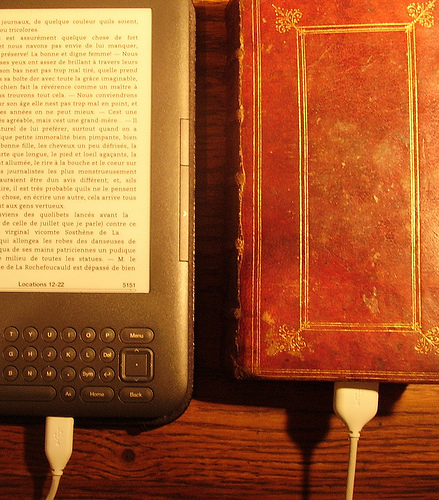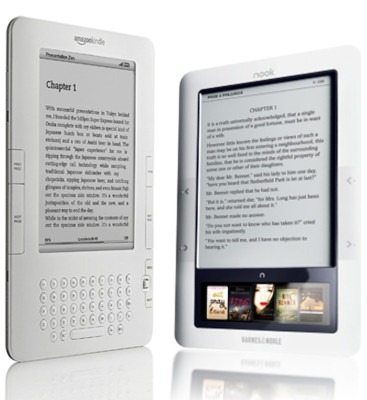I detect a bias in the way this week’s Booking Through Thursday question was asked:
With the advent (and growing popularity) of ebooks, I’m seeing more and more articles about how much “better” they can be, because they have the option to be interactive … videos, music, glossaries … all sorts of little extra goodies to help “enhance” your reading experience, rather like listening to the Director’s commentary on a DVD of your favorite movie.
How do you feel about that possibility? Does it excite you in a cutting-edge kind of way? Or does it chill you to the bone because that’s not what reading is ABOUT?
I know that there is a dedicated group of readers who seem to be anti-ebook and are worried about the direction reading is going in. I am not among their membership. I think ebooks are great. I think the possibilities for books are opening up. Who knows what ways we might be able to interact with them? I have an app on my iPhone that is a version of “The Three Little Pigs” (iTunes link) illustrated and read by a six-year-old boy in Texas. I also have another app based on “The Velveteen Rabbit,” (iTunes link) one of my favorite stories as a child because oh! I wanted my toys to become real. The app allows me to watch a video based on the book, read the book, listen to Meryl Streep read it, or read and record myself. I have a Sherlock Holmes Vook (video book—iTunes link) on my iPhone that allows me to view videos that contain insights into Sherlock Holmes and Victorian London. My [amazon_link id=”B002FQJT3Q” target=”_blank” ]Kindle[/amazon_link] has a feature that allows me to see what passages other readers like enough to highlight. I can share my own notes and highlights with others and access them online later with a secure link. It sure beats thumbing through a book trying to find that passage again. I love being able to move my cursor to look up words I don’t know in the dictionary.
If you haven’t guessed the answer to my question, I’m excited about the possibilities that ebooks and devices like the iPad and Kindle offer readers. Who says that reading has to fit some narrow definition or be confined by some idea that a book isn’t supposed to be a certain way? If you don’t want to interact with your book, you have the option not to—paper books have not gone anywhere and won’t go anywhere soon. I for one think that now is an exciting time to be a reader (and a writer—ebooks are opening up the closed world of publishing to indie writers like me).
I am starting to see a trend among readers who want to stop any sort of change. The most disturbing aspect of this trend to me is that these types of readers seem to believe that they are somehow more authentic readers or love books more because they don’t like ebooks. That’s snobbery. Why be so judgmental? So it’s not for you. Don’t do it. You can avoid ebooks if you want. But to insinuate that interactive features that are now available with the advent of ebooks detract from reading and are not what reading is ABOUT is a fairly antiquated opinion to hold. It rather reminds me of folks who insist graphic novels aren’t real books or that one should not read books like romance novels, mysteries, or chick lit. Bottom line? People should be able to read what they want, however they want, and other folks should have better things to do than stick their noses in the air about it. Put your nose back in your paperback where it belongs. I guess I am getting a little tired of these snobs telling me I shouldn’t read ebooks.
The subtitle of the photo I chose for this post is “un texte est un texte.” Translated into English, that means “a text is a text.” Exactly so.
Edited to add:
I forgot to mention ebooks on the iPad and Kindle and just about every other reader I can think of allow readers to change the font size, which opens up reading to people who couldn’t. So there is also that.
photo credit: Remi Mathis


